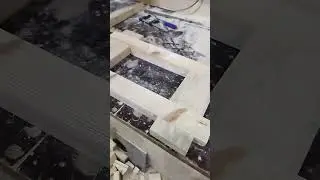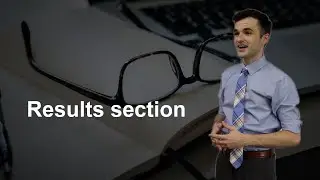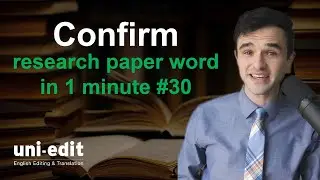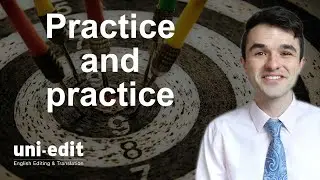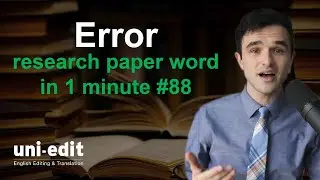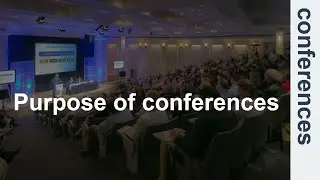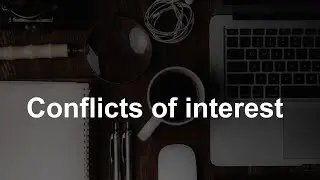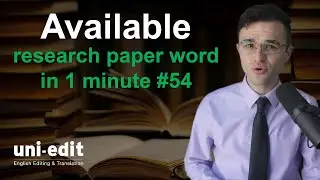Purpose of an academic conference and the different sessions
What is the purpose of an academic conference? What is the purpose of the different conference sessions? Why should you attend an academic conference?
Watch all of our videos on the purpose of an academic conference here: https://bit.ly/3jlgrpk
=====CHAPTERS=====
0:00 Introducing our guest, Jenny
0:42 What is an academic conference?
1:08 Are conferences only for academics?
1:35 Main purpose of an international academic conference?
2:03 How does an academic conference work?
2:41 what are the different types of conference sessions?
3:16 Plenary sessions
3:30 Keynote sessions
3:48 Panel sessions
4:05 Oral presentation sessions
4:29 Poster sessions
4:54 Workshops
5:12 Main reasons researchers attend conferences?
7:45 Like and subscribe to support our free content
=====SCRIPT OF VIDEO=====
"What is an academic conference?" Well, an academic conference is essentially a meeting that researchers attend to present their findings and hear about the latest work within their field.
Conferences aren't just for academics. They bring together a broad variety of perspectives from academics, people in the industry, and practitioners across several disciplines.
Conferences are designed to help researchers forge new connections. They can also build on their research and enrich their careers. They create an opportunity for academics and researchers from across the world to not only present and discuss their latest work, but also discover new and interesting developments in their field.
"So how does it work?" Well as as almost everyone who attends the event also presents at it. Conferences often have a program packed full of short presentations across a variety of topics. So there's a lot of information being shared and attendees won't likely be able to attend all of the presentations at one conference.
There's various types really including plenary, keynote, panel sessions, there's oral presentation sessions, poster sessions, and workshops. So a conference could be just one of those or it could contain several of them or even all of them.
The plenary session it typically involves all of the conference delegates and it's usually used to open the event. It sets the tone for the program and enables them to share important information about the conference. Then there's the keynote sessions. These feature speakers who are often well-known figures within the field. Next up there's panel sessions, these usually involve multiple researchers discussing, or perhaps debating one topic. Next I said was oral presentation sessions. So this is where multiple presenters give talks on their work around common themes or topics. Poster sessions are when attendees create a physical or often a digital poster that's displayed in the halls at an academic conference. So posters are usually presented at the same time over several hours in the same room and these allow more time for a detailed discussion with the presenter than the oral sessions would normally allow. And then finally the workshops um are often held on subjects like science communication, or to give advice on getting published in top journals. These are often geared towards researchers who are beginning their careers and can act as a good opportunity for them to meet each other.
The main reason to attend a conference is to present your research and share your ideas with other experts in your field and by doing so you can invite questions and comments that will ultimately help to strengthen your work, but presenting is not all of it, it's only part of the reason why you would go.
Because research submitted to an academic journal is often redrafted many times over, it it's usually many months between the first draft being submitted and the date of publication. But with a conference, the findings being presented tend to be more recent. So attending conferences is a great way to keep up with the emerging trends in your field. "Sounds like a great way to keep up with like the cutting edge research that's happening in the world." Definitely yes. And also you get information from the presentations to work out which of the speakers you saw, who you want to keep up to date with.
=====PLAYLISTS=====
Choosing an academic conference https://bit.ly/32KNT4m
Applying to academic conferences https://bit.ly/3HzGV0C
Travel to an academic conference https://bit.ly/3sUgeA0
=====UNI-EDIT SERVICES FOR AUTHORS=====
University English Editing & Translation service: https://uni-edit.net
Uni-edit specializes in language services for academics and researchers.
Research paper English editing: https://www.uni-edit.net/english-editing
Thesis and dissertation editing: https://www.uni-edit.net/phd-masters
School & job applications editing: https://www.uni-edit.net/School-appli...
Academic translation: https://www.uni-edit.net/translation
One-on-one academic English lessons: https://www.uni-edit.net/lessons
Email: [email protected]
CON210


